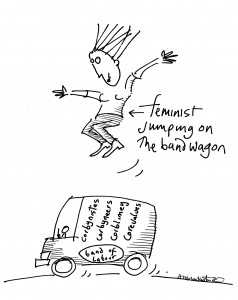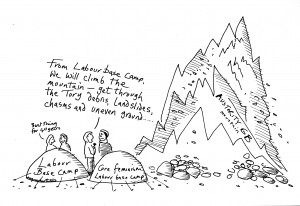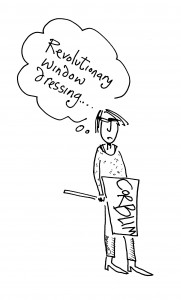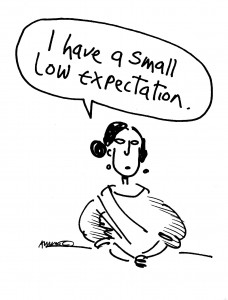Bringing up the body
Maddy Coy reviews Alison Phipps’s book The Politics of the Body, and finds it partial in both senses of the word
By Alison Phipps’s own account, her book The Politics of the Body sets out to ask ‘questions about how contemporary discussions of issues to do with women’s bodies reflect how we conceptualise embodiment’. Each chapter picks out a particular issue, or set of issues, relating to this general theme: the topics examined are sexual violence, gender and Islam, the politics of the sex industry and the reproductive regimes of birth and breastfeeding.
On the plus side, it’s good to see a feminist book that’s critical of the way neoliberalism has normalised ‘the politics of personal responsibility’ and conferred feminist status on any choice a woman makes, regardless of the constraints of social structure. It’s good to see someone examining discourses and debates around women’s bodies, and drawing on academic research to support, or dispute, what have become normative frameworks at best and incontestable truths at their most divisive. But it’s disappointing and frustrating to see this much-needed analysis marred by blind spots, misunderstandings and a thorough, seemingly deliberate hatchet-job on radical feminism.
For me, the book’s best and most accessible chapter is the last one, on birth and breastfeeding – the ‘new reproductive regimes of truth’. How, Phipps asks, has the ‘natural’ become so idealised, often robbing women of medical, technological advances that have made modern motherhood less painful and frankly, more convenient? When practices of attachment parenting and ‘the breastfeeding mafia’ are both lauded and decried by the mainstream media, even to suggest that there might be a place for epidurals, caesareans and formula milk as means for women to reclaim and re-inhabit a maternal body is no small stake in the ground.
Not that this is necessarily Phipps’ aim: rather she presents a careful argument about how choosing a ‘normal’ birth and the ‘self-sacrifice’ of breastfeeding is inextricably linked to privilege. In ‘attempt[ing] to apply the principle of intersectionality’, she calls out the way campaigns, initiatives and organisations that promote less intervention and ‘normal’ birth have become yardsticks by which to judge, as ill-informed and selfish, the choices made by the working class and minority women who are more likely to opt for pain relief and formula feeding. She unpicks the gender essentialisms behind these maternalist ideals, and how they have pushed women’s bodily autonomy aside in favour of ‘prescribed practices’. Never mind that research shows most women experiencing some form of ‘birth trauma’ have had ‘normal’ deliveries, or the inconsistencies in the evidence base on the benefits of breastfeeding. She points out that ‘only women who know they are able to give birth safely are able to reject the trappings of technology’, thus making a structural link with the romanticisation of natural birth in many parts of the world where there is little or no access to medical care. This, as she astutely observes, illustrates the ‘shift from rights to choices’.
Nor does the merchandising industry that has sprung up around managing labour pains, aiding ‘natural’ birth, breastfeeding and kangaroo care-style attachment parenting, escape her forensic gaze. How neat that a movement supposedly empowering women to do what comes naturally requires relentless consumerism! Here Phipps identifies the way feminist goals have been co-opted by a neoliberal fetishization of personal responsibility. It’s the kind of incisive analysis many feminists will have been hoping for.
The chapter on sexual violence also starts promisingly, with a critical account of the controversies that swirl around Julian Assange, his refusal to answer questions about allegations of sexual assault in Sweden, and the similar defences of Dominique Strauss-Kahn and Roman Polanski. The lefties who vocally supported Assange are painstakingly exposed. That powerful men have been allowed to abuse women with impunity has perhaps never been so publicly evident than at present, in the aftermath of the Jimmy Savile revelations and the arrests of various celebrities. Phipps shows that responses to Strauss-Kahn, Polanski and Assange were similarly revealing, and she distils these cases to explore ‘rape apologism’.
However, I am less than convinced by her argument that a central problem on the left is ‘an assumption that left-wing men are above misogyny’—not because I doubt that this assumption exists, but because it elides sexual violence with men’s hatred of women rather than their abuse of power. Some left-wing men might well be misogynists, but as feminists have long known, they can also be capable of abusing gendered power in ways that jar with their awareness of classed power. In this chapter on sexual violence (and the politics of victimhood), men’s entitlement to women’s bodies is discussed only once, with reference to Adrienne Rich, when surely it is central to any understanding of how all of these men were variously excused and idealised. Nor is there any reference here to the huge body of feminist work (much of it radical feminist) which relates to the debate on victimhood. It was after all Kathleen Barry who introduced the concept of ‘victimism’ in 1979 in her book Female Sexual Slavery.
Phipps does explore how the women abused by these men were interrogated by the media and found wanting, and links this insightfully to the way choice, agency and personal responsibility have come to dominate understandings of human behaviour. Yet her passing concern at how little attention is paid to the choices and agency of perpetrators is mirrored by the chapter itself. The argument here that only women’s choices have been ‘responsibilised’, especially with respect to sexual violence, leaves an echoing silence about men’s actions. The chapter ends with an ambivalent account of the controversy surrounding ‘Slutwalks’, celebrated as an initiative that rejects victim-blame and personal responsibility, but criticised at least in part because of concerns voiced by Black women about the racialisation of the term slut.
In the end, this chapter felt like a missed opportunity – a set of expectations raised and dashed, not least because of the sledge-hammer approach to radical feminism, which is repeatedly accused of an unholy alliance with neoconservative moralism, and used as the scapegoat for the deep suspicion with which left wing movements now regard victimhood.
Radical feminism: an enemy within?
In a book where every assertion is meticulously referenced, a strange and telling absence is the total lack of any reference to sources when repeating the assertion that radical feminism has embraced a ‘neoconservative gender essentialism’. So striking is this absence that it comes to define the author’s point of view. The refrain that there is a ‘convergence of radical feminism with neoconservative and neo-conservative law and order agendas’ is sprinkled throughout the entire text, sometimes on almost every page. In a couple of places ‘trafficking’ is invoked as an example of this alliance, but with no specific examples (of campaigns, support services or research) which might substantiate the point. In a book of this scope and potential, containing a thoughtful and sophisticated discussion of how neoliberalism and neoconservatism are defined and understood, it’s a pity Phipps fails to offer readers even the most basic definition of a strand of feminism that she repeatedly vilifies. It is hard to escape the conclusion that this omission is deliberate, for fear of giving radical feminist politics any intellectual legitimacy. Instead she reinforces every stereotype and myth (I’m sure you can reel them off without too much thought) in ways which ultimately diminish the intellectual integrity of her own position.
Taken at its most basic, radical feminism identifies men’s privilege over women as the root of women’s inequality, exercised particularly through entitlement to women’s bodies, and thus many activists on violence against women and girls trace the way we understand violence back to radical feminism. Many of the issues she engages with in the book – sexual violence, prostitution, crimes in the name of honour – owe their public profile to these very activists and the framings they use.
This is not to question the legitimacy of critiquing any political position, or the need to challenge the ways in which intersections with race and class have been less prominent than they should have been in some aspects of radical feminist theory and practice. But there is a disconnection throughout this book from the grassroots feminists who work on violence against women and girls. At times this is more of a shadow cast by the now familiar refrain about radical feminists jumping into bed with neocons, but it is also explicitly articulated, nowhere more obviously than in the chapter on gender and Islam.
For instance, Phipps insists on using the term ‘female genital cutting’ (linking the word ‘mutilation’ to an ‘Orientalist framework’) and when she uses the full term ‘female genital mutilation’ (FGM), she adds ‘[sic]’ to distance herself from it. There are interesting and legitimate debates about the meanings of the word mutilation, and particularly what it means for women who have undergone this form of violence to be labelled ‘mutilated’. Some use the term FGM/C to denote the complexities of finding language that does not alienate whilst also naming and defining. I would have welcomed discussion of this. But five seconds on the Internet would have told Phipps that many of the grassroots women’s organisations who specialise in campaigning against FGM (e.g. FORWARD, Daughters of Eve), led by women from practising communities who identify as survivors, use the term ‘mutilation’. This links the procedure to other forms of violence against women and girls. By insisting on using the term ‘cutting’ instead of ‘FGM’, Phipps manages at one stroke to decouple FGM from VAWG, placing herself at odds with international human rights approaches, and inadvertently slipping into both cultural relativism and colonial feminism.
It jars more than slightly for a privileged academic (Phipps refers to herself as ‘a white, western, able-bodied and cisgendered woman married to a man, living a fairly conventional middle-class lifestyle’) to reject the language that activists from the most respected and prominent NGOs use to frame the experiences of women in communities that practice FGM. I found myself wondering if Phipps deliberately rejects this framing because she views these organisations and survivors as under the umbrella of the radical feminists who are in turn in thrall to neocon law-and-order agendas. If so, then this example illustrates another way in which the intellectual positioning of this book, and Phipps’ wilful misrepresentation of radical feminism, leaves her arguments circulating within the rarefied sphere of the academy and totally detached from contemporary activism.
Not only is the term ‘female genital cutting’ used in this chapter, but the similarly problematic ‘wife-beating’ (with no ‘[sic]’ to suggest that it is someone else’s term with which she disagrees). There is a short section in this chapter on constructions of honour killing, which succinctly addresses the ways in which ‘culture’ (conflated with Islam?) is used as justification and explanation, whilst the motivations of ‘white’ men who kill women are not attributed to notions of honour. However, once again, to devote less than a page to violations of women’s bodies in a chapter of this potential scope, and instead spend most of its space on veiling, is wholly inadequate. What the key issues are for a political sociology of women’s bodies with respect to Islam depends on perspective; in the media it is indeed about veiling, and the contentions around ‘banning the burqa’. For those of us in the VAWG sector, there are deeper questions about the violations of women’s bodies, and representations of the Black woman’s body in relation to honour-based violence. There is, of course, a broad argument made here about the challenges facing feminism. But language matters, and ideas matter, and Phipps has chosen to position herself at one remove from specialists in the field and from many feminist activists.
The chapter on the sex industry reinforces this. Trafficking is only referenced in relation to that now rather tired old refrain about rad fems cheering on neocon rescue industries, a charge levelled at feminist organisations providing support to women who have been trafficked. Elsewhere, this slur is more insidiously used to suggest that such NGOs exaggerate the extent of trafficking. Again, my point here is not that the notions of rescue do not feature in the framings used by some of those that support victims of trafficking. I would have welcomed a discussion unpicking and evidencing this. Unfortunately, Phipps manages to problematise critical feminist perspectives on trafficking while providing no evidence for what is often a lazy pejoration.
The main thrust of this chapter, however, is a deconstruction of the ways in which arguments about women’s agency have been used to make the voices and experiences of the most privileged women in the sex industry the loudest. The wonderful term ‘sex work glitterati’ is deployed to great effect, exposing again how the appearance of cool liberalism privileges women who already enjoy social and economic capital, yet have become the ‘authentic’ voice of the sex industry. There is brief acknowledgement of how structural inequalities result in women choosing to commodify their bodies, which is then plated with a seemingly impenetrable veneer of voluntarism. The gendered asymmetry of prostitution is recognised, and ‘whorephobia’ – an accusation levelled noisily at most of us who critique the social institution of the sex industry – is identified as an example of the ‘politics of recognition’ which chooses to ignore structural inequalities.
So why might this otherwise trenchant critique be so disquieting? The first reason is relatively superficial – she insists on using the term ‘sex work’ throughout, language inextricably associated with the position that she critiques, rarely used by women in the sex industry (except by the ‘sex work glitterati’ that she discusses) and of course rejected by those of us with a more critical engagement. Secondly, in the binary of philosophically incompatible positions that Phipps discusses – sex radicals who celebrate the empowering potential of the sex industry and radical feminists for whose position she provides no explanation – she draws entirely on sex radical writing and research. Fair enough for a chapter aiming to interrogate this position. But it seems disingenuous to write a chapter on the politics of the sex industry which does not acknowledge any of the feminists who have for decades developed our thinking and empirical knowledge about it. It effaces our history, doubly so because it allows her to claim radical feminists’ arguments as her own.
Let us take a couple of her examples. (1) Evidence of trauma in ‘sex work’ – referenced to her own review of literature on this, not the radical feminist-inspired original research by Melissa Farley and her colleagues. (2) Failure of sex radicals to make the link between wider commodification of women’s bodies, especially in heterosexual exchanges? I can think of several pioneering – and radical – feminists who first put forward these very arguments. Kate Millett, Andrea Dworkin, Catharine Mackinnon and Sheila Jeffreys all developed analyses which linked heterosexuality, the social institution of marriage, women’s economic dependence and men’s entitlement to women’s bodies. Yet they are invisible here.
We all build on the work of others, of course, and sometimes we may be unaware of some of these influences and omit to credit those who first say new things. However, combined with the constant belittling of radical feminism, the omission here seems less the self-absorption of which we can all be guilty and more a conscious attempt by Phipps to make the work of those with critical views of the sex industry invisible, and thus unimportant. I think of my students, who might take this chapter as a measured and balanced discussion of feminist politics on prostitution, and how they might finish it with no sense of the richness and complexity of radical feminist critiques; instead they will have a fist full of references for writers on the sex industry from a different position, and be left with a completely unbalanced view of the history and present shape of this debate. A deeper analysis would have considered the argument that there is nothing ‘sex radical’ about accepting that men need access to the bodies of the world’s poorest women and girls for sexual release. Phipps seems again unable to critique men’s actions and the choices they make to use women’s bodies.
As a treatise on how progressive movements, with progressive goals, have been co-opted by neoliberal agendas, this book will be a thought provoking and uncomfortable read for many. Phipps identifies some hugely important questions, not least the problem for feminism of figuring out how it got itself into a kind of ideological impasse: caught between a libertarian position, which holds to questionable notions of agency, and an experiential position which runs the risk of being cast as moralistic and authoritarian. The disappointing thing is that Phipps herself reinforces this dichotomy, uncritically reproducing the caricature version of a materialist feminism which is at the root of most activism around violence against women. For those of us that locate our politics of the body in radical feminism, however loosely, this book will cause discomfort because of the way it dismisses or misrepresents our thinking and political activism.






